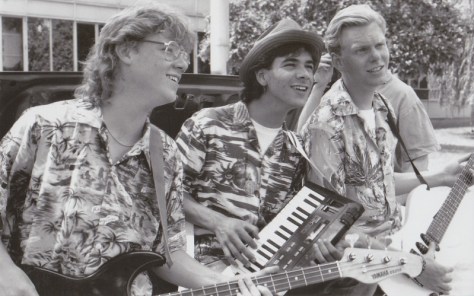By Stefan Brogren
So last year we were cancelled by our American broadcaster. Without much more explanation than, “We think Degrassi has run its course.†It was over. Truth is, we’ve always had a problem fitting in. We’re not a sitcom, we’re not 90210—and most of our subject matter deals with the most God-awful aspects of growing up.
Still, I was dumbfounded. Why give up a series that’s the teen equivalent to the Star Trek franchise (don’t shoot me)? It could go on forever!
OK, yes. There are a bunch of reasons to say Degrassi should call it a day and just go away (I’m rhyming, yo).
We’ve been making the show for a jillion years and for some folks that’s just annoying.
We have a serious lack of students that are vampires, werewolves, mutants or serial killers—not for a lack of trying, mind you.
And the big one. We’re unabashedly Canadian. We’re reminded of this every time the States makes a list of what makes Canada … Canada. “Poutine! Canucks! Degrassi! Trees!†I know, it’s annoying.
You could say we “recycle†the same subject matter every couple of years (drugs, sex, boners, mental health, boners, peer pressure, boners). But if you think being a teenager now is the same as the good ol’ days of Joey streaking the caf, well then you haven’t checked your effin’ Snapchat feed lately. Manny freaking out because her boobs were put on the Internet (Season 5, The Next Generation) has zero relevance to a generation that send and receive “junk pics†on their smartphones as part of the dating process. Sorry parents. They all do it. Seriously. All of them. Even the sweet ones. Boners. No one’s safe.
For lots of people (who probably haven’t watched the show in years), Degrassi is painfully earnest in its depiction of teens—and earnest equals not cool.
Skins is cool. Degrassi is … earnest.

I’m biased obviously, but Degrassi isn’t earnest in its depictions of teen life. It’s thoughtful. Our fans grow up watching and adoring shows like The Vampire Diaries, The 100 and Pretty Little Liars. They’re awesome and fantastical. Then they turn around and watch Degrassi with all the crappy, gross, embarrassing, manic, euphoric, lovely and ridiculously funny moments that come with being 17. And it feels like a friend.
So we were cancelled. And then, in what seemed like the next day, we were given new life on Netflix. The second season of Degrassi: Next Class premieres in Canada on Family Channel on July 19th and streams on Netflix July 22nd. If you haven’t watched Degrassi in a whole bunch of years, give it a shot. I promise you, we have 70 per cent more boner stories than any other show out there. Period. (And probably the most period stories too.)
Degrassi: Next Class airs Tuesdays at 9:45 p.m. ET on Family Channel.
Stefan is well known to Canadians for his six years on the television series Degrassi Junior High and Degrassi High. He was a Gemini Award nominee for Best Actor at age 17. Stefan is a graduate of the American Academy of Dramatic Arts, Los Angeles, where he won the prestigious Michael Thomas Award for acting excellence. Stefan has made numerous television appearances, including the series Sue Thomas: F.B. Eye, Wild Card, Jonathan Cross’s Canada, Twitch City, I Was A Sixth Grade Alien and The Associates. Stefan can also be seen in the movie Too Smooth with Neve Campbell and Rebecca Gayheart. Stefan has since become a key part of the Degrassi production team taking on the role of Series Producer. Adding Director to his responsibilities, Stefan has helmed numerous Degrassi episodes, as well as the MOWs Degrassi Goes Hollywood and D: NYC – Degrassi Takes Manhattan. In 2010, Stefan won a Gemini Award for Best Direction in a Children’s or Youth Program or Series. He followed this up with another win in 2014 at the Canadian Screen Awards. Stefan has also co-produced, directed and written a large portion of Degrassi’s original digital content. In addition, Stefan was also a Co-Executive Producer and Director on the two seasons of the MuchMusic/CW series The L.A. Complex and the first season of the YTV/TeenNick series Open Heart.













